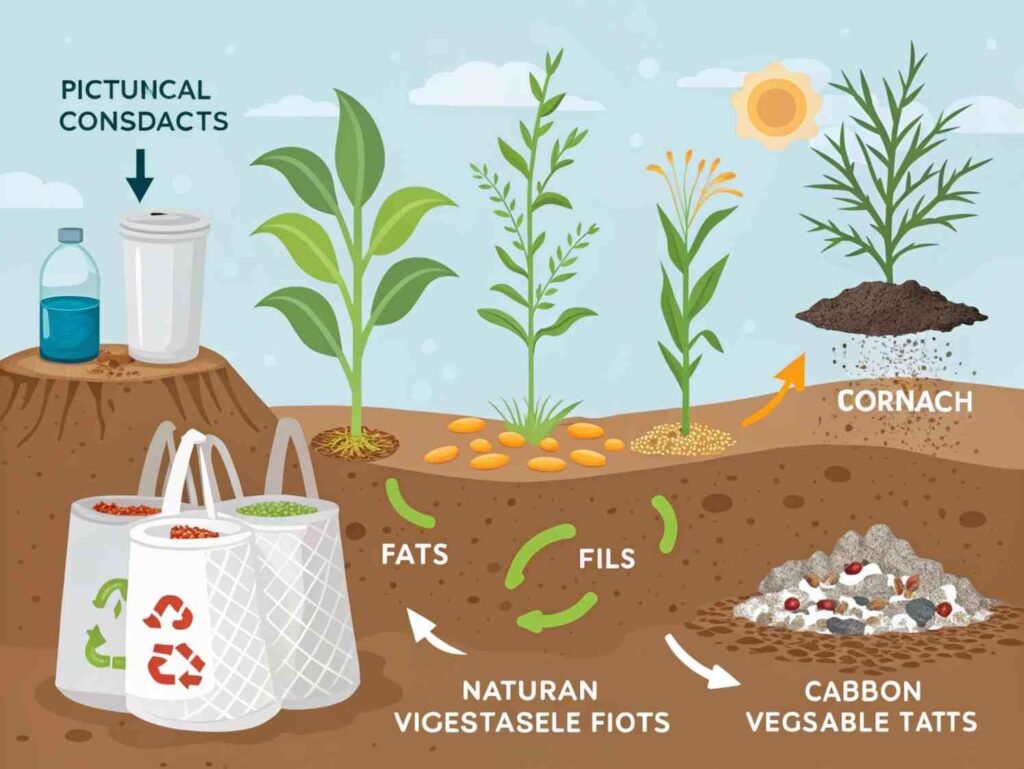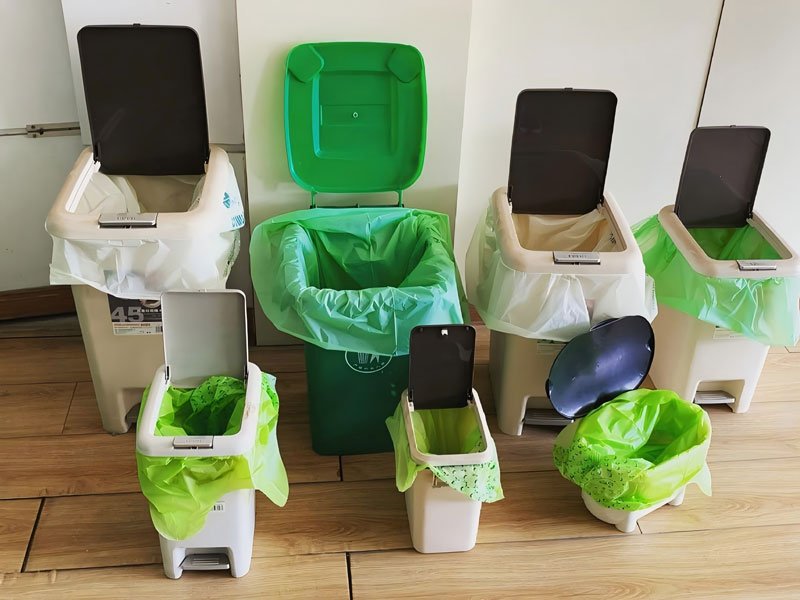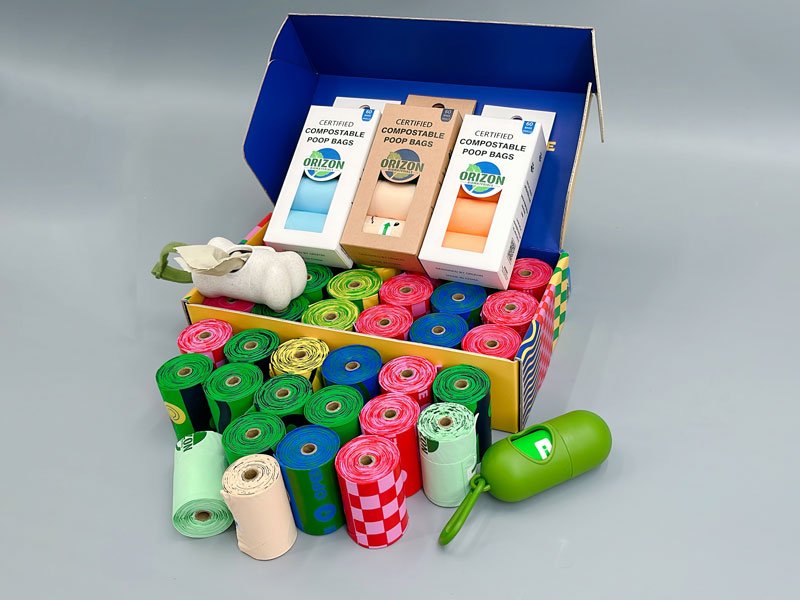Have you heard of compostable plastic bags? For many users, plastic bags are more familiar to everyone, but what are compostable plastic bags? How to choose a reliable quality compostable plastic bags manufacturer. I will explain to you in detail the best compostable plastic bags manufacturer in the world, I hope it will be helpful to you.
As global attention to sustainable development intensifies, compostable plastic bags have emerged as a pivotal solution to plastic pollution. A growing number of businesses are now seeking reliable compostable plastic bags manufacturers to fulfill their eco-friendly packaging needs.
This article offers an in-depth analysis of the top global compostable plastic bag manufacturers in 2025, helping you understand their production processes, the advanced materials used such as PLA, PBAT, and PHA, and how to select the best eco-friendly packaging supplier for your business based on international certification standards like EN 13432 and ASTM D6400. We will not only list the industry leaders but also provide a comprehensive guide to ensure you find the perfect partner for your sustainable packaging solutions.
Why Should You Care Compostable Plastic Bags?
Compostable bags can help tackle the plastic pollution crisis. With single-use plastics banned in places like the EU and China, these bags are a lifeline for businesses and consumers looking to go green without sacrificing convenience. Certifications such as EN13432, BPI or Australia’s AS 5810 are a guarantee that the bags are environmentally friendly.
What Are Compostable Plastic Bags?
Compostable Plastic Bags completely break down into water, carbon dioxide, and organic matter when placed in a composting environment (like an industrial facility, or in a backyard compost bin). Compostable bags disappear in 90-180 days under the right conditions, leaving no toxic residue.
"Compostable" is different from "biodegradable." Compostable bags meet strict standards, such as EN13432 in Europe or BPI certification in the United States, to fully decompose in a specific composting environment.
Biodegradable plastic bag manufacturers produce plastic bags that break down naturally over time, but the decomposition process may be slower or more unpredictable, and they don't always require a composting facility. Don't fall into the trap of "oxo-degradation" - these plastic bags only break down into tiny plastic fragments and don't really break down.
How Compostable Plastic Bags Made Of
Compostable plastic bags are designed to break down naturally into organic matter under specific composting conditions, unlike traditional plastic bags that persist in the environment for centuries. They are typically made from renewable, bio-based materials or biodegradable polymers.
- Raw materials: Compostable bags are made from bio-based materials, corn starch or sugar cane, but some use biodegradable polymers (fossil-based) that are processed to extract the components of compostable plastics.
- Polymer synthesis: Raw materials are converted into polymers.PBAT is synthesized from petroleum and chemical products and has biodegradable properties.
- Extrusion and film forming: The polymer is melted and extruded into a thin plastic film.
- Blown film: The film is blown into a tube using air. The thickness and size can be adjusted to meet the needs, such as food bags or garbage bags.
- Customization: Custom printing with your logo. Cutting and sealing machines form the film into finished bags, ready for use.
- Quality control: The bags are tested for compostability, strength and certification. This ensures that the bag can be carried and decomposed at the same time.

Materials and Technologies
- PLA (polylactic acid): Made from corn starch or sugar cane, it is affordable and decomposes very quickly in an industrial composting environment. The disadvantage is that it is relatively brittle and not resistant to high temperatures. It is suitable for products such as food packaging bags or disposable lunch boxes that do not require high strength.
- PBAT (polybutylene adipate terephthalate): Made from fossil raw materials, it can also be biodegraded. It is particularly soft and tough, and is often used in combination with PLA. The mixed material is strong and easy to decompose. It is suitable for garbage bags and shopping bags that need to bear weight.
- Starch-based materials are directly extracted from crops such as corn and potatoes. They are low-cost and have average strength. They are usually used to make thin bags, such as those used to store fruits and vegetables in supermarkets. Although they are not so strong to use, they are very thorough in decomposition.
- PHA (polyhydroxyalkanoate): A compostable material produced by microorganisms that breaks down organic waste, it has excellent performance. It can be broken down in industrial composting facilities and can also be processed in home compost bins. It is more expensive and not very common in the market.
Compostable Vs Biodegradable Plastic Bags vs. Traditional Plastic Bags
How do compostable bags compare to biodegradable bags and traditional plastic bags? Let’s break it down.
| Aspect | Compostable | Biodegradable | Traditional |
|---|---|---|---|
| Material | PLA, PBAT, starch, PHA | Broader range (e.g., PBAT, PCL) | Polyethylene (PE), Polypropylene (PP) |
| Decomposition Time | Months in composting facilities | Months to years, variable conditions | Centuries in landfills/oceans |
| Environmental Impact | Minimal waste, certified eco-friendly | Variable, may leave residues | Persistent pollution, microplastics |
| Cost | Higher (20-50% more than PE) | Moderate to high | Low, but externalized environmental costs |
| Performance | Limited durability, heat-sensitive | Varies, some mimic traditional plastics | Highly durable, versatile |
Why choose compostable bags? They are professionally certified to break down cleanly, comply with regulations such as the UK Plastics Pact, and have a certain appeal to environmentally friendly brands. Environmentally conscious businesses can use compostable bags, and many are willing to pay a high fee.
Disadvantages? Relatively higher prices, most require industrial composting facilities. Greenwashing risk - some "biodegradable" bags may not be professionally certified.

Biodegradable Compostable Plastic Bag Manufacturers Distribution
Compostable plastic bags are in a period of rapid development, with an estimated annual growth rate of 9.2% by 2030 compared to 2023. Why is it growing so fast? The issuance of the plastic ban, the enhancement of environmental protection concepts, and the increase in companies pursuing ESG.
Let's analyze the hot spots of global compostable plastic bag manufacturers:
China: The compostable bag market has low production costs and large production capacity, which is the biggest advantage. Companies like BioGreen Biotech focus on starch-based bags, which are affordable; GreenDot Biopak specializes in the research and development of PLA/PBAT composite materials. Most of the world's biodegradable plastic products now cannot bypass the Chinese supply chain.
India: The momentum is very strong, relying on the advantages of agricultural resources to rise rapidly. Compostable.in, a company specializing in bags suitable for home composting, just caters to the growing environmental protection needs in India.
Europe: It is a "boutique route". Bags produced by old companies such as Novamont and BASF SE all meet strict environmental certification. The EU's plastic ban is becoming more and more stringent, which has created opportunities for local companies.
North American market: Focus on innovation, companies like Elevate Packaging rely on BPI-certified products to conquer the world. American and Canadian companies are particularly good at environmental marketing, and they also work hard on material performance.
Compostable bags for home use (compliant with AS 5810) are becoming increasingly popular, as are bags made from recycled or ocean-bound plastic. Manufacturers are also working with retailers to create sustainable supply chains, with grocery stores, for example, switching to compostable produce bags.

How to Choose the Right Compostable Plastic Bags Manufacturer?
When choosing the right compostable plastic bag manufacturer, the first consideration is the standards to which its products are certified.
- Internationally recognized certifications: Europe’s EN 13432 (Requirements for Industrial Composting), the United States’ ASTM D6400 (Specification for Degradable Plastics in Municipal or Industrial Composts), and Australia’s AS 5810 (Specification for Degradable Plastics in Home Composts) are the gold standard for true compostability.
- Reputable eco-friendly packaging manufacturers: those that offer products that meet these standards and are BPI certified or TÜV AUSTRIA OK compost HOME/INDUSTRIAL certified should also provide customized solutions for degradable trash bags, compostable shopping bags, or courier bags.
- Confirm that the manufacturer’s production process: complies with environmental regulations, and has a stable supply chain and excellent customer service to ensure the smooth implementation of your sustainable packaging solution.
Excellent compostable plastic bags manufacturer:
- ORZION (China): 16 years of focus on the production and development of compostable bags. The company is mainly OEM wholesale customization and focuses on product quality.
- GreenDot Biopak (India): Master of PLA/PBAT blends, ideal for producing durable compostable bags.
- Compostable.in (India): Specializes in home compostable bags, using local crops.
- Elevate Packaging (USA): BPI certified, focused on creating eco-friendly brands for the US market.
Conclusion
Let's talk about compostable plastic bags - they're not perfect, but they're definitely moving us in the right direction for a greener future. Manufacturers are getting creative with materials like PLA, PBAT and PHA to make packaging that actually breaks down properly. What sets these bags apart is that they come with legit eco-certifications - something regular "biodegradable" plastics often lack.
Now, they're not without their challenges. The price tag is higher, and we need better composting systems to handle them. But if you're running a business, it might be worth reaching out to certified suppliers for samples - could be a smart way to step up your sustainability game.



